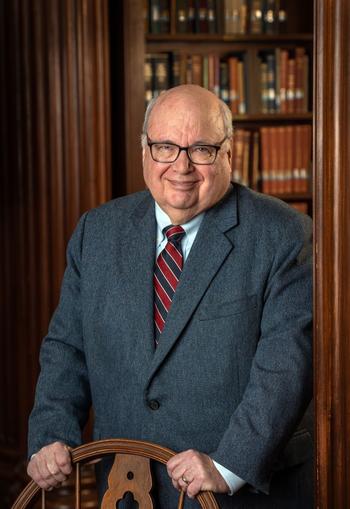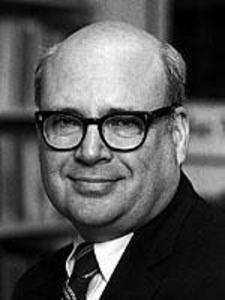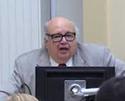By John Stoehr
In preparing to write this appreciation of the life and career of Robert Wilson ’67 B.D., I stumbled upon a fascinating fact. In addition to being Hoober Professor of Religious Studies at Yale and Professor of Old Testament at the Divinity School, as well as mentor and colleague to countless pastors, preachers, teachers, and scholars over the span of more than four decades, Professor Wilson is also a deeply learned and highly skilled timpanist.
 Wilson, who will retire at the end of the academic year, has been playing the kettle drum in orchestras in his native Kentucky and later in New Haven since childhood. He started in the seventh grade and he never stopped. It was so important he took Fridays during his time as Associate Dean of YDS so he could rehearse in the orchestra at Saybrook College. He has been a member of the Civic Orchestra of New Haven since 1975. He gave it up only this year.
Wilson, who will retire at the end of the academic year, has been playing the kettle drum in orchestras in his native Kentucky and later in New Haven since childhood. He started in the seventh grade and he never stopped. It was so important he took Fridays during his time as Associate Dean of YDS so he could rehearse in the orchestra at Saybrook College. He has been a member of the Civic Orchestra of New Haven since 1975. He gave it up only this year.
When asked, he can’t quite explain why he took to the timpani instead of, say, the snare drum. There was just something ineffable about the connection, he said, in the same way there’s something ineffable about learning how to be a good scholar, a good teacher, or a good minister.
“I don’t know why,” he said during an interview in his office in February. “I was never comfortable with the snare drum. I had an immediate affinity for the timpani. I have no idea why I was comfortable with it. Apparently, I was good at it.”
It was on his way to music lessons that Wilson first encountered his future calling as a biblical scholar. He had to walk by Louisville’s free public library, where as a boy he signed out books on ancient Egypt, the old Middle East, and especially archaeology. After arriving at Yale Divinity School as a student years later, he developed a taste for Near Eastern texts. He left archaeology behind and never looked back.
He wanted to understand, in a practical way, how religious workers behaved in a social context. He taught himself anthropology, especially the structures of lineage-based societies and the role of prophecy in them, in an attempt to understand the social background of the Hebrew Bible. Even now, he’s working on a book on exile as a sociological phenomenon. Whether it’s published, Wilson said with a deadpan expression, depends “if I live long enough.”
***
“Old Testament Interpretation Part I”: Watch the new Robert Wilson lecture series on YouTube.
***
It’s important to teach curiosity, Wilson said, but you don’t want disciples. That’s what they do in Europe, he said, where there’s a higher premium put on “schools of thought” than on individual excellence. “I try to discourage (students from) doing the same thing I’m doing,” he said. “I try to get students interested in the texts and push them toward developing their own ways of being interested. Most of my students have developed their own voices. The goal is to emerge from your studies as distinct scholars, not clones.”
“There many paths to salvation,” he added, dryly.
Salvation requires a leap of faith. So does the process of learning to teach, according to Wilson. There’s no good way to teach it, he said, except telling students to observe good teaching—then jump. “Good teachers have a way of putting things together,” he said. “They have a way of working with the material. Students recognize that, and they learn by observing good teaching.”
“I’m proud of all my students,” Wilson added. “Some went on to be teachers. Some went on to be pastors. Some went on to be scholars. One of my former students is now the pastor of the Louisville church in which I grew up.
“That’s a good feeling.”
***
From the archive: Robert Wilson celebrating 40 years at Yale, a lifetime of biblical interpretation
***
Robert R. Wilson received a B.D. in 1967, an M.A. in 1969, and a Ph.D. in 1972, all at Yale,. Afterward, he published numerous volumes, including Genealogy and History in the Biblical World (Yale University Press, 1977), Prophecy and Society in Ancient Israel (Fortress Press, 1980) and Sociological Approaches to the Old Testament (Fortress Press, 1984). These books went on to become extremely influential for a generation of biblical scholars.
 “Bob Wilson’s Prophecy and Society in Ancient Israel was standard reading when I was a graduate student,” recalled YDS Dean Greg Sterling. “I still remember reading it and thinking about prophecy from an entirely different perspective. His anthropological and sociological perspective was a major and original contribution to the study of prophecy.
“Bob Wilson’s Prophecy and Society in Ancient Israel was standard reading when I was a graduate student,” recalled YDS Dean Greg Sterling. “I still remember reading it and thinking about prophecy from an entirely different perspective. His anthropological and sociological perspective was a major and original contribution to the study of prophecy.
“Bob has been at Yale long enough that he has become part of the institution. I have depended upon him for institutional memory on multiple occasions and am deeply grateful for his wisdom, and all of the contributions he has made to Yale.”
John Collins, the Holmes Professor of Old Testament Criticism & Interpretation, also speaks of Wilson in glowing terms.
“Bob has been a pillar of the Yale faculty for almost 50 years,” Collins said. “For much of that time, he was partnered with the late Brevard Childs in the field of Old Testament. Childs was a towering figure, but he had a strong theological agenda that was not shared by all. Bob was remarkably free of ideological concerns, and he provided access to the Old Testament from a calm scholarly perspective. His work on prophecy from the 1970s remains unsurpassed, but his main contribution lies in his patient tutoring of generations of students.”
***

***
Wilson’s teaching was informed by pastoral experience as much as it was by academics. In 1965, he was an assistant minister at Lordship Community Church, a UCC congregation in Stratford. That experience, he said, “increased my respect for the ability to read a congregation. It’s an underappreciated thing.”
The movement against the war in Vietnam was in full flower by the time of his arrival, Wilson said, but congregants there were not receptive to its message. Many worked for Sikorsky, the aerospace firm, or Lycoming, a major manufacturer of aircraft engines. To some congregants, to be antiwar was to be anti-defense industry, which was antithetical to how they made their livings.
“I learned how to understand the needs of the congregation,” Wilson said. “It’s important for clergy to be where the congregation is before moving it somewhere else. You need the ability to be self-critical and to understand how the minister is like, or is different, from the congregation itself.”
“I’ve seen too many cases in which clergy march into the church determined to effect change and don’t seem to understand that the congregation isn’t the problem if nothing happens,” Wilson said. “There is an art to this. Pastoring is an art, just as music is an art.”
Picking out a highlight of his career isn’t easy, Wilson said. Nor is it interesting to him. What matters, he said, is Yale Divinity School’s consistent quality. “It’s hard to answer that question,” he said. “There are different ways the institution moves but I was always able to follow my scholarly interests.
“When I talk to colleagues, it’s not only interesting. It’s helpful. Students are brilliant before they start taking classes. There is a kind of regularity you appreciate the longer you are here. Being in this environment, being immersed in it, is like being in the Boston Symphony, always high quality.”